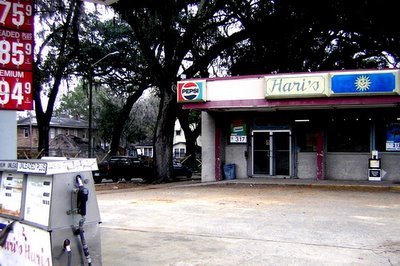One building I feel safe in inspecting closely is Hari's Food Store, a formidable contender for the title of Savannah's least attractive convenience store.

The reason I got into the habit of surveilling Hari's is this: It is source of successive waves of automobiles that flow into the roadway. The operators of these vehicles seldom show much regard for approaching cars and display absolutely none for approaching bicycles. I've found it pays to keep an eye on Hari's and prepare for evasive maneuvers, whether one is traveling down Habersham Street by bike, car, truck, sports ubiquity vehicle or M1 Abrams Main Battle Tank.
Last week, I noticed something different about Hari's. There weren't any cars were streaming out of the parking lot into my path. In fact, the store was locked and completely empty. While the lights were still on, the interior of the store was clearly devoid of shelving and merchandise.
One of my coworkers lives less than 200 yards from Hari's. I've heard him complain about Hari's for a reason different from my own: It is the source of successive waves of honey bun wrappers, empty beer bottles and losing scratch-off tickets that wash ashore in his front yard. I figured he'd be pleased that the place was locked up. When I asked him about it, he said he had no idea Hari's was closed.
Cars insulate us not just from the weather, but from the life of the neighborhoods through which we drive. To become aware of the subtle day-to-day changes in our communities, a different sort of vehicle is required. I'm lucky that I get to use such a vehicle almost every day.

No comments:
Post a Comment